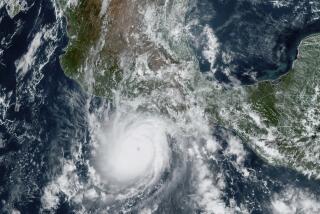Devotion to Life of Political Activism in Family’s Blood
The day after the American military campaign began in Iraq, Medea Benjamin -- her pink dress soaked in ersatz blood, a plastic baby’s foot dangling from a pink ribbon around her neck -- was leading an antiwar demonstration in Washington, D.C.
Back home in San Francisco, husband Kevin Danaher and daughter Arlen, 22, were part of the crowd raging through the streets, shutting down businesses and snarling traffic. Meanwhile, daughter Maya, 12, was with middle-school friends delivering an antiwar speech before thousands of people gathered at Civic Center Plaza.
The Benjamin-Danahers, who live in a snug two-story Victorian house here, are by no means a typical American family. The parents are co-founders of Global Exchange, a San Francisco-based “anti-corporate globalization” organization that figured prominently in the 1999 Seattle demonstrations against the World Trade Organization. Arlen, a recent UCLA honors graduate, spent her freshman year on the Westwood campus organizing a campaign against the student bookstore for selling products she said came from sweatshop labor.
But like other families of the American left, they have been galvanized by the war in Iraq.
Medea Benjamin, 50, a Long Island, N.Y., native has emerged as one of the high-profile leaders of the peace movement. Since November, her Code Pink women’s organization has staged vigils, marches and sit-ins in the nation’s capital.
The group’s signature is the color pink, which Benjamin chose to disarm feminine stereotypes. Despite early criticism, the movement succeeded in attracting everyone from “naked, painted and pink” nude protesters to middle-class churchgoers in pink suits who attended prayer meetings.
“We realized the power of pink,” Benjamin said this week.
After four months in Washington, Benjamin, who was a Green Party candidate for the U.S. Senate from California in 2000, said she had returned to San Francisco to reunite with her family and plan the next round of activism.
“Some people will take on the issue of civilian casualties,” she predicted. “Other people will tackle the issue of how we are going to stop future invasions. A lot of people will want to focus on the United Nations. Others will focus on the companies that make money from the war.”
While his wife was on the East Coast, Kevin Danaher, 52, a UC Santa Cruz PhD who specializes in global economic issues, said he played the role of “Mr. Mom” back home. “We are like any family,” he said, “in that we want our kids to do well in school and lead happy, balanced lives.”
When they founded the nonprofit Global Exchange organization in 1988, its first headquarters was in their home in the city’s quiet Noe Valley section.
In addition to its central participation in the 1999 Seattle demonstrations, Global Exchange led a campaign against Nike and other U.S.-based companies with foreign operations. Global Exchange has an annual budget of $6 million, out of which Benjamin and Danaher are each paid $39,000, Danaher said.
Like much of today’s antiwar movement, Global Exchange is a largely Internet-driven organization with a Web site at www.globalexchange.org. Similarly, computers are central to the Benjamin-Danaher household.
Each family member has a laptop, connected to a central high-speed household network. “Sometimes we message each other from across the room,” joked Danaher, a former American University professor who has written several books.
On a recent morning, Arlen was hunched over her laptop reviewing her law school applications. Named for Nicaraguan revolutionary heroine Arlen Siu, she is Benjamin’s daughter from her marriage to a Cuban she met while working for the United Nations food program in Africa.
“I grew up believing that protest lines and teach-ins were normal family outings,” Arlen wrote in her law school application essay.
“I was born in Cuba to an Afro-Cuban father and Jewish-American mother, and the fact that I was named for the first woman to die fighting for the Nicaraguan [Sandinista] Revolution gives you an idea of my politically oriented upbringing.”
With the help of her mother, one of Arlen’s first acts at college was to track the origin of a UCLA T-shirt she received at freshman orientation. She said the research led back to a sweatshop in Honduras and, thus, to her later founding of a student organization to fight sweatshops.
Interviewed before she headed off to her seventh-grade classes in San Francisco, the youngest daughter, Maya Mandela Benjamin-Danaher -- whose middle name comes from the South African freedom fighter and eventual national leader -- said she was not always happy with her parents’ peripatetic political activism.
“When I was little,” Maya confessed, “I kind of hated it and resented my mom for always being away. But now it’s kind of cool because I’m at that age where you don’t really want your mom around all the time.”
Both parents said they couldn’t have been prouder of their 12-year-old during the antiwar demonstrations in San Francisco last week. Maya first walked out of her middle school with other students in protest. Then she took the stage at the Civic Center Plaza to speak for the group.
“I just talked about Bush and why I think he was wrong to go to war with Iraq,” Maya said. “I just think there’s lots of ways he could have solved the problem without going to war.”
More to Read
Start your day right
Sign up for Essential California for news, features and recommendations from the L.A. Times and beyond in your inbox six days a week.
You may occasionally receive promotional content from the Los Angeles Times.






